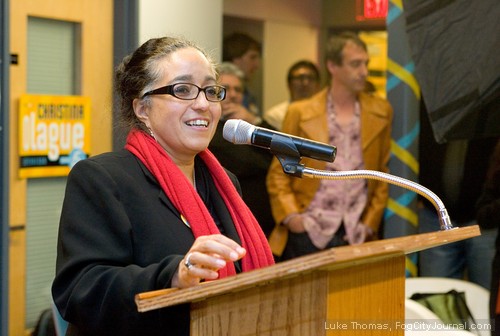
District 5 Supervisor Christina Olague. Photo by Luke Thomas.
Editor’s Note: An ordinance sponsored by Supervisor Scott Wiener and co-sponsored by Supervisor Christina Olague aims to weaken voter-approved historical preservation protections. Developers and construction unions are supportive of the legislation while historical preservation and tenants groups are opposed. The legislation, which recently passed out of committee, will be voted on by the full Board of Supervisors on Tuesday, May 8.
May 5, 2012
Dear Supervisor Olague,
The Harvey Milk LGBT Democratic Club urges you as a member of the LGBT community to reject Supervisor Wiener’s legislation that will weaken historic preservation laws in San Francisco. The worst parts of this legislation will be a monumental step backwards for San Francisco and its efforts to protect our most precious historic resources and progressive history.
We are extremely troubled that you appear to be buying into the flawed, bogus and self-serving arguments by SPUR and other supporters of this legislation that historic preservation is classist and leads to gentrification, interferes with the production of affordable housing and is a tool of San Francisco’s elite. Nothing could be further from the truth. In reality, this legislation favors the most privileged classes in San Francisco – those that have a financial interest in tearing our communities apart and displacing our most vulnerable. Our historic preservation laws are already weak enough and there is no need to weaken them further. These laws are tools that have helped San Francisco protect rent-controlled housing and the fabric of our communities that are under tremendous development pressure. The Milk Club supported Proposition J in 2008 to strengthen historic preservation, not to see it undermined by this Board of Supervisors. The voters of San Francisco agreed and like us are shocked that preservation laws are under attack.
Currently, historic districts are proposed to safeguard the history, achievements and edifices that are integral to San Francisco’s LGBT community as well as San Francisco’s Filipino Community. Supervisor Wiener’s wrong-headed requirement that would require a vote of landowners will thwart the ability to create these districts in the future. His recent amendment to include non-landowner “occupants” are not satisfactory to us and will not be successfully implemented by the Planning Department. We also, question why this legislation singles out historic preservation for landowner input, singles out historic districts for compliance with Regional Housing goals, and does not allow members of the public or organizations such as ours to nominate landmarks and historic districts. Historic preservation is being singled out for disparate, unequal treatment which is not required for any other zoning changes in our Planning Code. As voices of a community that has suffered this kind of treatment we are deeply disturbed by this.
Some of San Francisco’s infamous land use injustices could have been prevented with the use of historic preservation protections. The International Hotel in San Francisco’s Manilatown was a historic building deserving of landmark status. With Supervisor Wiener’s legislation conferring historic district status on Manilatown today would be virtually impossible.
Supervisor, we are calling on you to do the right thing and reject these amendments.
Please join with us, the San Francisco Tenants Union and San Francisco Heritage in rejecting Supervisor Wiener’s legislation to weaken historic preservation protections in San Francisco.
Sincerely,
Glendon Hyde, President, Harvey Milk LGBT Democratic Club.


 The Hunger Site
The Hunger Site
May 5, 2012 at 8:43 am
The Historic Preservation Law was a mistake. It is too restrictive and gives too much power to the commission.